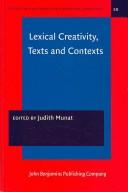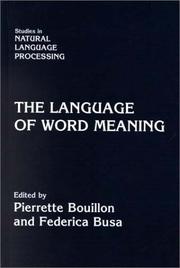| Listing 1 - 8 of 8 |
Sort by
|
Book
ISBN: 9783110517927 3110517922 3110519887 3110518015 3110709473 Year: 2018 Volume: 4 Publisher: Berlin: de Gruyter,
Abstract | Keywords | Export | Availability | Bookmark
 Loading...
Loading...Choose an application
- Reference Manager
- EndNote
- RefWorks (Direct export to RefWorks)
This volume seeks to shed light on the interdependencies between wordplay and language creativity. Contributions explore the most diverse genres and discourses throughout History —anagrams, medieval fatrasies, the works of Rabelais, children books, slam, riddles, and contemporary constrained writing—, trying to understand their theoretical, didactic and historical impact.
Semiotics --- Créativité (linguistique) --- Linguistique --- Sémiotique --- Linguistique. --- Sémiotique.
Book
Abstract | Keywords | Export | Availability | Bookmark
 Loading...
Loading...Choose an application
- Reference Manager
- EndNote
- RefWorks (Direct export to RefWorks)
Grammaire générative. --- Grammaire comparée. --- Cartésianisme. --- Créativité (linguistique) --- Descartes, René, --- Critique et interprétation
Book
ISBN: 9783706906098 Year: 2010 Publisher: Wien : Praesens,
Abstract | Keywords | Export | Availability | Bookmark
 Loading...
Loading...Choose an application
- Reference Manager
- EndNote
- RefWorks (Direct export to RefWorks)
Im vorliegenden Buch geht es nicht um Mehrsprachigkeitsforschung an sich, sondern darum, den mehr oder weniger stringenten Zusammenhang von individueller oder gesellschaftlicher Mehrsprachigkeit und Kreativität im Allgemeinen bzw. literarischer Kreativität im Besonderen zu erforschen. Der interdisziplinäre Ansatz besteht darin, diesen angenommenen Zusammenhang – die deutschsprachige Literatur des 20. Jahrhunderts und des beginnenden 21. Jahrhunderts lassen einen solchen vermuten – aus der Perspektive der einzelnen Fächer zu untersuchen. Biographieforschung, Mehrsprachigkeitsforschung, Kognitionswissenschaft, Neurolinguistik, angewandte Linguistik, interkulturelle Linguistik, Übersetzungswissenschaft, Hybriditätsforschung, Literaturwissenschaft und Komparatistik versuchen, zu dieser Themenstellung das Ihre beizutragen.
Creativity in literature --- Kreativität. --- Literatur. --- Mehrsprachigkeit. --- Multilingualism and literature --- Genua <2009>. --- Multilinguisme et littérature. --- Créativité (linguistique) --- Multiculturalisme.
Book
ISBN: 9781474298919 9781474298926 9781474298933 9781474298940 Year: 2019 Publisher: London Bloomsbury Academic
Abstract | Keywords | Export | Availability | Bookmark
 Loading...
Loading...Choose an application
- Reference Manager
- EndNote
- RefWorks (Direct export to RefWorks)
Cognitive Grammar in Stylistics: A Practical Guide provides an engaging, accessible and practically-focused introduction to cognitive grammar outlining how central principles of the field can be used in stylistic analyses. Assuming no prior knowledge, the book leads students through the basics of cognitive grammar, outlining its place within the field of cognitive linguistics as a whole, providing clear explanations of key principles and concepts. It then explains how these can be used to study a range of literary and non-literary texts.The book argues that cognitive grammar offers a powerful alternative to more traditional grammatical models when analysing texts. Its primary focus is on the practical application of cognitive grammar to examples of language in context and on its potential for both literary and non-literary material. It offers a clear and facilitating approach to allow students to describe language features carefully and to explore how these descriptions can be developed into full and rich analyses.Suitable for undergraduate students taking modules in stylistics, English language, and cognitive linguistics, as well as postgraduates encountering the field for the first time, the book provides a much-needed and essential guide to this exciting subject.
Cognitive grammar. --- Grammar, Comparative and general --- Language and languages --- Creativity (Linguistics) --- Linguistique cognitive --- Grammaire comparée --- Créativité (linguistique) --- Style. --- Style littéraire. --- Stilistics --- Grammar --- Psycholinguistics --- Grammaire comparée --- Créativité (linguistique) --- Style littéraire.

ISBN: 1282152416 9786612152412 9027291756 9789027291752 9027215677 9789027215673 9789027215673 Year: 2007 Volume: 58 Publisher: Amsterdam ; Philadelphia : J. Benjamins Pub. Co.,
Abstract | Keywords | Export | Availability | Bookmark
 Loading...
Loading...Choose an application
- Reference Manager
- EndNote
- RefWorks (Direct export to RefWorks)
The coining of novel lexical items and the creative manipulation of existing words and expressions is heavily dependent on contextual factors, including the semantic, stylistic, textual and social environments in which they occur. The twelve specialists contributing to this collection aim to illuminate creativity in word formation with respect to functional discourse roles, but also examine 'critical creativity' determined by language policy, as well as diachronic phonetic variation in creatively-coined words. The data, based either on large corpora or smaller hand-collected samples, is drawn from advertising, the daily press, electronic communication, literature, spoken interaction, cartoons, lexical ontologies and style guides. Each study analyses novel formations in relation to their contexts of use and inevitably leads to the crucial question of creativity vs. productivity. By focussing on creative lexical formations at the level of parole, these studies provide insights into morphological theory at the level of langue, and ultimately seek to explain lexical creativity as a function of language use.
Lexicology. --- Creativity (Linguistics) --- Creative ability (Linguistics) --- Linguistic creativity --- Competence and performance (Linguistics) --- Linguistics --- Psycholinguistics --- English language --- Language and languages --- Lexicology --- #KVHA:Lexicologie --- #KVHA:Taalkunde --- Fiction --- Lexicologie --- --Lexicology --- Créativité (linguistique)
Book
ISBN: 9781408251881 9781315833224 9781317861218 9781317861225 9781138146006 Year: 2012 Publisher: Harlow Pearson
Abstract | Keywords | Export | Availability | Bookmark
 Loading...
Loading...Choose an application
- Reference Manager
- EndNote
- RefWorks (Direct export to RefWorks)
Discourse and Creativity examines the way different approaches to discourse analysis conceptualize the notion of creativity and address it analytically. It includes examples of studies of creativity from a variety of traditions and examines the following key areas, how people interpret and use discourse, the processes and practices of discourse production, discourse in modes other than written and spoken language, and the relationship between discourse and the technologies used to produce it.Discourse and Creativity combines a forward-thinking and interdisciplinary approach to the topic of creativity; this collection will be of great value to students and scholars in applied linguistics, stylistics, and communication studies.
creativiteit --- Developmental psychology --- creativity --- Pragmatics --- Discourse analysis --- Creation (Literary, artistic, etc.) --- Creativity (Linguistics) --- Communication and technology --- Semantics --- Analyse du discours --- Créativité (linguistique) --- Communication et technologie --- #KVHA:Taalkunde --- #KVHA:Discourse analysis --- #KVHA:Creativiteit --- Discourse grammar --- Text grammar --- Semiotics --- Creative ability (Linguistics) --- Linguistic creativity --- Competence and performance (Linguistics) --- Linguistics --- Psycholinguistics --- Technology and communication --- Technology --- Discourse analysis. --- Analyse du discours. --- Communication et technologie. --- Créativité (linguistique)

ISBN: 0521780489 0521080142 051189631X Year: 2001 Publisher: Cambridge Cambridge University Press
Abstract | Keywords | Export | Availability | Bookmark
 Loading...
Loading...Choose an application
- Reference Manager
- EndNote
- RefWorks (Direct export to RefWorks)
This volume is a collection of original contributions from outstanding scholars in linguistics, philosophy and computational linguistics exploring the relation between word meaning and human linguistic creativity. The papers present different aspects surrounding the question of what is word meaning, a problem that has been the centre of heated debate in all those disciplines that directly or indirectly are concerned with the study of language and of human cognition. The discussions are centred around a view of the mental lexicon, as outlined in the Generative Lexicon theory (Pustejovsky, 1995), which proposes a unified model for defining word meaning. The individual contributors present their evidence for a generative approach as well as critical perspectives, which provides for a volume where word meaning is not viewed only from a particular angle or from a particular concern, but from a wide variety of topics, each introduced and explained by the editors.
Lexicology. Semantics --- Mathematical linguistics --- Grammar --- Semantics. --- Creativity (Linguistics) --- Generative grammar --- Computational linguistics --- Sémantique --- Créativité (Linguistique) --- Grammaire générative --- Linguistique informatique --- Computational linguistics. --- Generative grammar. --- Creativity (Linguistics). --- Sémantique --- Créativité (Linguistique) --- Grammaire générative --- Semantics --- Formal semantics --- Semasiology --- Semiology (Semantics) --- Comparative linguistics --- Information theory --- Language and languages --- Lexicology --- Meaning (Psychology) --- Grammar, Comparative and general --- Grammar, Generative --- Grammar, Transformational --- Grammar, Transformational generative --- Transformational generative grammar --- Transformational grammar --- Psycholinguistics --- Creative ability (Linguistics) --- Linguistic creativity --- Competence and performance (Linguistics) --- Linguistics --- Automatic language processing --- Language data processing --- Natural language processing (Linguistics) --- Applied linguistics --- Cross-language information retrieval --- Multilingual computing --- Derivation --- Data processing --- Créativité --- Arts and Humanities --- Language & Linguistics
Book
ISBN: 2030703400 9782030703403 Year: 1975 Publisher: Paris: Larousse,
Abstract | Keywords | Export | Availability | Bookmark
 Loading...
Loading...Choose an application
- Reference Manager
- EndNote
- RefWorks (Direct export to RefWorks)
Lexicology. Semantics --- French language --- Words, New --- Grammar, Comparative and general --- Creativity (Linguistics) --- Generative grammar --- Néologismes --- Formation des mots --- Créativité (Linguistique) --- Syntaxe --- Grammaire générative --- Word formation --- Syntax --- -Creativity (Linguistics) --- -Generative grammar --- Grammar, Generative --- Grammar, Transformational --- Grammar, Transformational generative --- Transformational generative grammar --- Transformational grammar --- Psycholinguistics --- Comparative grammar --- Grammar --- Grammar, Philosophical --- Grammar, Universal --- Language and languages --- Philosophical grammar --- Linguistics --- Philology --- Creative ability (Linguistics) --- Linguistic creativity --- Competence and performance (Linguistics) --- Coinage of words --- Neologisms --- New words --- Words, Coinage of --- Vocabulary --- Derivation --- Grammar, Comparative --- Words, New. --- Generative grammar. --- Word formation. --- Syntax. --- Creativity (Linguistics). --- Néologismes --- Créativité (Linguistique) --- Grammaire générative --- Derivational morphology --- Morphology --- Grammar, Comparative and general - Word formation --- Grammar, Comparative and general - Syntax --- Grammar, Comparative and general Syntax --- Francais (langue) --- Lexicologie --- Langage et langues --- Neologismes --- Langues
| Listing 1 - 8 of 8 |
Sort by
|

 Search
Search Feedback
Feedback About UniCat
About UniCat  Help
Help News
News